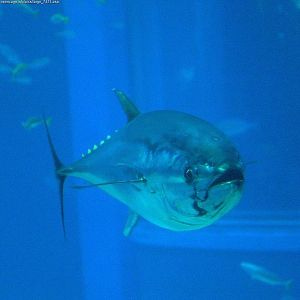Fishy politics that stink

It is time for European nations to finally show leadership and ban the trade in tuna
LATE tomorrow morning in Brussels an important meeting takes place for the bluefin tuna. It could well decide the fate of the species, and whether it is going to be fished to extinction or at last protected from the overexploitation that has caused its population to crash to unprecedented lows. The northern bluefin tuna (Thunnus thynnus) is classified as critically endangered for the Western Atlantic stock and endangered for the Eastern Atlantic stock 1,2.
It is an appalling story. Historically the bluefin has been tragically failed by a group of nations that collaboratively manage the fishery. The organisation known as ICCAT (The International Commission for the Conservation of Atlantic Tunas) is supposed to manage the fishery but in reality it is little more than set of paper pushers in Madrid for the nations that meet every December. Every year, behind closed doors, the member nations hand themselves quotas far in excess of scientific advice. These quotas are handed out in the knowledge that Europe’s fishermen will then go out and catch more than double this allowance through illegal landings in the poorly managed fishery.
Bluefin politics are ugly because all these deals to allow the hunting of a species to extinction are done behind closed doors and in order to eward a vocal but powerful political group—fishermen.They have allowed the economically irrational over extraction of a resource, and essentially stolen fish that belongs to all of us and given it to a handful of people.
For a long time, Europe’s tuna fishermen have had things nicely wrapped up. The tuna fishing interests of Italy, France and Spain would lobby the Commission’s directorate general of fisheries, which would say nice words publicly about bluefin conservation, monitoring and management and then go out to ICCAT every year, and then negotiate another deal that was disastrous for the fishery.
Matters came to a head last year when the chair of ICCAT warned its members that if they didn’t show some leadership then management of the species would be taken away. Such calls were in vain. So now the world looks towards a trade ban under a convention known as CITES in order to protect this fish. While the bluefin easily qualifies (such is its level of imperilment) if only that were enough to make sure that could be protected. Politics, as ever, intrude.
The first step for the bluefin is for two members of the CITES to propose a listing before a deadline in October. Monaco the Mediterranean principality, under the leadership of its bluefin-loving Prince Albert, was the first to step forward. Now the world is waiting to see what the Europeans will do. At first the news was good, France threw its weight behind the plan, to the surprise of conservationists President Nicolas Sarkozy supported an end to the overfishing. Britain, Germany and other northern European states have supported a ban. So after some political warfare in Brussels between the department involved in ‘managing’ fish and the department involved in environmental protection, and some heavy lobbying by the sushi-loving Japanese, the Commission decided that a proposal to CITES was appropriate 3.
It is with regret that I write that I now understand that the vote on Monday is far from a formality. Rumour now has it that the French are now backing away from a full CITES listing, and the Spanish are trying to organise outright opposition.
Meanwhile, fresh evidence has emerged of how completely out of control this fishery is with illegal fishing continuing unabated, a French vessel has recorded some astonishing abuses by the Turkish fleet. The management measures that were supposed to protect the bluefin are not working.
All this underscores the need for a trade ban. Trade bans are not always the solution for an imperilled species, as they create some crazy economic dynamics such as an illegal trade dominated by organised crime. And on land a ban eliminates the value for a species and can in turn encourage habitat conversion. But habitat conversion isn't a problem for the bluefin, and organised crime is already heavily involved in the bluefin trade. So CITES is the only serious tool left to allow the international community to address the needs of a species that lives outside of the control of national governments. It is no longer reasonable to argue that ICCAT can be trusted with a job that it has failed so long to perform.
Furthermore a ban would, finally, prevent the fashionable diners of America, Europe and Japan to keep consuming the species with a clean conscience or blissful ignorance. Nobu restaurants around the world would finally be forced to remove the bluefin from the menu. Others would follow.
If European nations fail show leadership over a CITES listing, it may be that the only hope is that the Americans will step in. The politics are not straightforward, as Jane Lubchenco, head of America's National Oceanic and Atmospheric Administration, said when I asked her about this a few weeks ago, there are concerns about how a CITES ban would affect the domestic bluefin industry in America, where the situation is not as disastrous as in the Meditteranean.
Nonetheless, it is clear that the Americans are watching the Europeans very closely indeed and waiting to see how its hand plays out. At the Bali conference on climate change in 2007, America was warned that it was either to "lead or get out of the way". That message should now be delivered to the Europeans over bluefin.



